Jonathan Edwards
Jonathan Edwards, (born October 5, 1703, East Windsor, Connecticut [U.S.]—died March 22, 1758, Princeton, New Jersey), greatest theologian and philosopher of British American Puritanism, stimulator of the religious revival known as the “Great Awakening,” and one of the forerunners of the age of Protestant missionary expansion in the 19th century. Jonathan was the fifth child and only son among 11 children; he grew up in an atmosphere of Puritan piety, affection, and learning. After a rigorous schooling at home, he entered Yale College in New Haven, Connecticut, at the age of 13. He was graduated in 1720 but remained at New Haven for two years, studying divinity. After a brief New York pastorate (1722–23), he received the M.A. degree in 1723; during most of 1724–26 he was a tutor at Yale. In 1727 he became his grandfather’s colleague at Northampton.
The Resolutions of Jonathan Edwards
He was a young man unsure of his future. He had many gifts and not a few options before him. His father and grandfather were ministers, as were uncles and others in the family tree. He had a first-rate education, one of the finest of the day, so he was well-prepared for a future in the halls of the academy, should he so choose. He even had a penchant for science and perhaps could have headed off in that direction. But for the time being he was a pastor, a young pastor at that. Eighteen going on nineteen, he found himself far from his native soil of the Connecticut River Valley in the throes of a church split in a Presbyterian church in New York City. He had been invited to pastor the minority faction somewhere along the docks of the city’s harbor. New York City wasn’t nearly as busy in 1722, the year in question, as it is now. The population hovered around just under ten thousand. For a young man from the idyllic setting of small town New England, however, it was a place unlike any he had ever seen.
(Stephen Nichols/ Ligonier 1/1/24)
READ MORE>>>>>
He was a young man unsure of his future. He had many gifts and not a few options before him. His father and grandfather were ministers, as were uncles and others in the family tree. He had a first-rate education, one of the finest of the day, so he was well-prepared for a future in the halls of the academy, should he so choose. He even had a penchant for science and perhaps could have headed off in that direction. But for the time being he was a pastor, a young pastor at that. Eighteen going on nineteen, he found himself far from his native soil of the Connecticut River Valley in the throes of a church split in a Presbyterian church in New York City. He had been invited to pastor the minority faction somewhere along the docks of the city’s harbor. New York City wasn’t nearly as busy in 1722, the year in question, as it is now. The population hovered around just under ten thousand. For a young man from the idyllic setting of small town New England, however, it was a place unlike any he had ever seen.
(Stephen Nichols/ Ligonier 1/1/24)
READ MORE>>>>>
July 6, 2023: Gospel Coalition: Let Jonathan Edwards Be Your Spiritual Guide
here’s no end to the writing of books about Jonathan Edwards. Over the past two generations, scholars have rediscovered Edwards, culminating in the 26-volume Works of Jonathan Edwards published by Yale University Press (plus another 52 volumes available exclusively online). During the same period, Edwards reemerged as something of a patron saint among many evangelicals, especially those appreciative of the Reformed tradition or concerned with spiritual awakening.
here’s no end to the writing of books about Jonathan Edwards. Over the past two generations, scholars have rediscovered Edwards, culminating in the 26-volume Works of Jonathan Edwards published by Yale University Press (plus another 52 volumes available exclusively online). During the same period, Edwards reemerged as something of a patron saint among many evangelicals, especially those appreciative of the Reformed tradition or concerned with spiritual awakening.
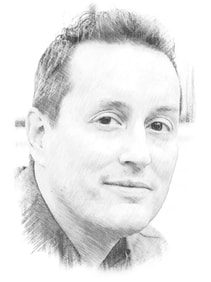 Trevin Wax Files
Trevin Wax Files
Treating theologians as “all or nothing” isn’t the way to go. It’s not wise to tar and feather past theologians or uncritically embrace them. Sinful forebears still have something to teach us.
The impulse on social media is to put everyone in quick and easy boxes so we know instantly who the “heroes” and “villains” are, but real life is gloriously complicated. Some of those we might call “villainous” had heroic traits of virtue, while those we might call “heroes” had villainous streaks of sin.
Instead, looking deeper requires us to carefully reckon with sin’s distorting effects in the theological outlook of past theologians. Onsi Kamel recommends we “look at the specific loci of thought and the particular sin, and then investigate in particular how the thought was noticeably impacted by the sin. And then discount or warn about or treat carefully those dimensions of thought.”
We should wonder . . .
How did Luther’s vicious anti-Semitism affect his approach to the Old Testament? Did his view of the Jews shape his sharp distinctions between law and gospel or his two-kingdoms approach to society?
How did Edwards’s slaveholding affect his understanding of mercy and justice? How did it alter the way he understood the Bible or his view of God? How did it shape his view of how society is to be ordered or his doctrine of humanity? Does the fact Edwards’s son became an ardent abolitionist complicate these questions?
How might Barth’s adultery have influenced his views on sin and grace? Did his willful rebellion and theological gymnastics diminish his understanding of God’s judgment? Did they play a part in some of his semi-universalistic musings?
Sanctification is often uneven, and I understand if this article complicates the issue and stirs up more questions than answers. That’s why we need more debate about past theologians, not less. More complexity, not simplistic answers. Truth isn’t served by hagiography or exalted biographical sketches that minimize the sins of theologians from the past. Neither is truth served by the impulse to see only the sins and not the signs of sanctification in the lives of influential thinkers. --Trevin Wax; Gospel Coalition: Should We Cancel Karl Barth, Martin Luther, and Jonathan Edwards? 2.28.23
The impulse on social media is to put everyone in quick and easy boxes so we know instantly who the “heroes” and “villains” are, but real life is gloriously complicated. Some of those we might call “villainous” had heroic traits of virtue, while those we might call “heroes” had villainous streaks of sin.
Instead, looking deeper requires us to carefully reckon with sin’s distorting effects in the theological outlook of past theologians. Onsi Kamel recommends we “look at the specific loci of thought and the particular sin, and then investigate in particular how the thought was noticeably impacted by the sin. And then discount or warn about or treat carefully those dimensions of thought.”
We should wonder . . .
How did Luther’s vicious anti-Semitism affect his approach to the Old Testament? Did his view of the Jews shape his sharp distinctions between law and gospel or his two-kingdoms approach to society?
How did Edwards’s slaveholding affect his understanding of mercy and justice? How did it alter the way he understood the Bible or his view of God? How did it shape his view of how society is to be ordered or his doctrine of humanity? Does the fact Edwards’s son became an ardent abolitionist complicate these questions?
How might Barth’s adultery have influenced his views on sin and grace? Did his willful rebellion and theological gymnastics diminish his understanding of God’s judgment? Did they play a part in some of his semi-universalistic musings?
Sanctification is often uneven, and I understand if this article complicates the issue and stirs up more questions than answers. That’s why we need more debate about past theologians, not less. More complexity, not simplistic answers. Truth isn’t served by hagiography or exalted biographical sketches that minimize the sins of theologians from the past. Neither is truth served by the impulse to see only the sins and not the signs of sanctification in the lives of influential thinkers. --Trevin Wax; Gospel Coalition: Should We Cancel Karl Barth, Martin Luther, and Jonathan Edwards? 2.28.23
Feb 20, 2023: Baptist News Global: Questions to ask while pondering if Asbury is hosting a ‘true revival’
Surprise! It’s a revival!
So said Thomas H. McCall, a theology professor at Asbury Theological Seminary, located adjacent to the ongoing spiritual event at Asbury University in Wilmore, Ky. “Sometimes God does what Johnathan Edwards called ‘surprising work’ and what John Wesley referred to as ‘extraordinary’ ministry,” he recalled.
Surprise! It’s a revival!
So said Thomas H. McCall, a theology professor at Asbury Theological Seminary, located adjacent to the ongoing spiritual event at Asbury University in Wilmore, Ky. “Sometimes God does what Johnathan Edwards called ‘surprising work’ and what John Wesley referred to as ‘extraordinary’ ministry,” he recalled.
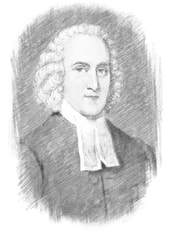 Jonathan Edwards Files
Jonathan Edwards Files
“God is the highest good of the reasonable creature. The enjoyment of him is our proper; and is the only happiness with which our souls can be satisfied. To go to heaven, fully to enjoy God, is infinitely better than the most pleasant accommodations here. Better than fathers and mothers, husbands, wives, or children, or the company of any, or all earthly friends. These are but shadows; but the enjoyment of God is the substance. These are but scattered beams; but God is the sun. These are but streams; but God is the fountain. These are but drops, but God is the ocean.”
― Jonathan Edwards, The Works of Jonathan Edwards, Vol. 17: Sermons and Discourses, 1730-1733
― Jonathan Edwards, The Works of Jonathan Edwards, Vol. 17: Sermons and Discourses, 1730-1733
“You contribute nothing to your salvation except the sin that made it necessary.”
― Jonathan Edwards
― Jonathan Edwards
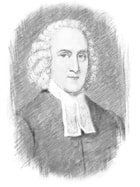 Jonathan Edwards Files
Jonathan Edwards Files
An obvious pattern in the Bible is that God tests the faith and stamina of his people as they cry out in prayer for some significant mercy. He tests them by withholding the mercy they are asking for. Not only that, but first he makes things worse, sending them discouraging setbacks. But count on it – he will eventually prosper those who push through in urgent prayer without quitting and will not take no for an answer.
--Jonathan Edwards, “A Call to United Extraordinary Prayer,” in Works (Edinburgh, 1979), II:312.
--Jonathan Edwards, “A Call to United Extraordinary Prayer,” in Works (Edinburgh, 1979), II:312.
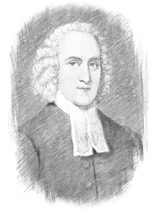 Jonathan Edwards
Jonathan Edwards
"The subject that very much enrages an arbitrary prince, is liable to suffer the most extreme torments that human art can invent, or human power can inflict. But the greatest earthly potentates in their greatest majesty and strength, and when clothed in their greatest terrors, are but feeble, despicable worms of the dust, in comparison of the great and almighty Creator and King of heaven and earth. It is but little that they can do, when most enraged, and when they have exerted the utmost of their fury. All the kings of the earth, before God, are as grasshoppers; they are nothing, and less than nothing: both their love and their hatred is to be despised." -Jonathan Edwards; Sinners in the Hands of an Angry God Prov20:2
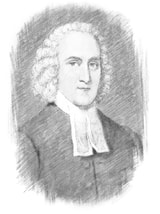 Jonathan Edwards
Jonathan Edwards
John 13:15, 16
For I have given you an example, that he should do as I have done to you. Verily, verily, I say unto you, The servant is not greater than his lord, neither he that is sent greater than he that sent him.
WE have in the context an account of one of the many very remarkable things that passed that night wherein Christ was betrayed (which was on many accounts the most remarkable night that ever was), viz. Christ's washing his disciples feet; which action, as it was exceeding wonderful in itself, so it manifestly was symbolical, and represented something else far more important and more wonderful, even that greatest and most wonderful of all things that ever came to pass, which was accomplished the next day in his last sufferings. There were three symbolical representations given of that great event this evening; one in the passover, which Christ now partook of with his disciples; another in this remarkable action of his washing his disciples feet. Washing the feet of guests was the office of servants, and one of their meanest offices. And therefore was fitly chosen by our Savior to represent that great abasement which he was to be the subject of in the form of a servant, in becoming obedient unto death, even that ignominious and accursed death of the cross, that he might cleanse the souls of his disciples from their guilt and spiritual pollution.
This spiritual washing and cleansing of believers was the end for which Christ so abased himself for them. Tit. 2:14, Who gave himself for us, that he might redeem us from all iniquity, and purify unto himself a peculiar people. Eph. 5:25, 26, Christ loved the church, and gave himself for it, that he might sanctify and cleanse it with the washing of water. That Christs washing his disciples feet signified this spiritual washing of the soul, is manifest by his own words in the 8th verse of the context, Peter saith unto him, Thou shalt never wash my feet. Jesus answered him. If I wash thee now, thou has no part with me. Christ, in being obedient unto death, even the death of the cross, not only did the part of a servant unto God, but in some respects also of a servant unto us. And this is not the only place where his so abasing himself for our sakes is compared to the doing of the part of a servant to guests. We have the like representation made in Luke 22:27, For whether is greater, he that sitteth at meat, or he that serveth? Is not he that sitteth at meat? But I am among you as he that serveth. And wherein Christ was among the disciples as he that did serve, is explained in Mat. 20:28. Namely, in his giving his life a ransom for them.
When Christ had finished washing his disciples feet, he solemnly requires their attention to what he had done, and commands them to follow his example therein. Verses 12-17, So after he had washed their feet, and had taken his garments, and was set down again, he said unto them, Know ye what I have done unto you? Ye call me Master and Lord, and ye say well, for so I am. If I then, your Lord and Master, have washed your feet, ye also ought to wash one anothers feet: for I have given you an example, that ye should do as I have done to you. Verily, verily, I say unto you, The servant is not greater than his Lord, neither he that is sent greater than he that sent him. If ye know these things, happy are ye if ye do them.
-Jonathan Edwards; Portsmouth, at the ordination of the Rev. Mr. Job Strong, June 28, 1749
For I have given you an example, that he should do as I have done to you. Verily, verily, I say unto you, The servant is not greater than his lord, neither he that is sent greater than he that sent him.
WE have in the context an account of one of the many very remarkable things that passed that night wherein Christ was betrayed (which was on many accounts the most remarkable night that ever was), viz. Christ's washing his disciples feet; which action, as it was exceeding wonderful in itself, so it manifestly was symbolical, and represented something else far more important and more wonderful, even that greatest and most wonderful of all things that ever came to pass, which was accomplished the next day in his last sufferings. There were three symbolical representations given of that great event this evening; one in the passover, which Christ now partook of with his disciples; another in this remarkable action of his washing his disciples feet. Washing the feet of guests was the office of servants, and one of their meanest offices. And therefore was fitly chosen by our Savior to represent that great abasement which he was to be the subject of in the form of a servant, in becoming obedient unto death, even that ignominious and accursed death of the cross, that he might cleanse the souls of his disciples from their guilt and spiritual pollution.
This spiritual washing and cleansing of believers was the end for which Christ so abased himself for them. Tit. 2:14, Who gave himself for us, that he might redeem us from all iniquity, and purify unto himself a peculiar people. Eph. 5:25, 26, Christ loved the church, and gave himself for it, that he might sanctify and cleanse it with the washing of water. That Christs washing his disciples feet signified this spiritual washing of the soul, is manifest by his own words in the 8th verse of the context, Peter saith unto him, Thou shalt never wash my feet. Jesus answered him. If I wash thee now, thou has no part with me. Christ, in being obedient unto death, even the death of the cross, not only did the part of a servant unto God, but in some respects also of a servant unto us. And this is not the only place where his so abasing himself for our sakes is compared to the doing of the part of a servant to guests. We have the like representation made in Luke 22:27, For whether is greater, he that sitteth at meat, or he that serveth? Is not he that sitteth at meat? But I am among you as he that serveth. And wherein Christ was among the disciples as he that did serve, is explained in Mat. 20:28. Namely, in his giving his life a ransom for them.
When Christ had finished washing his disciples feet, he solemnly requires their attention to what he had done, and commands them to follow his example therein. Verses 12-17, So after he had washed their feet, and had taken his garments, and was set down again, he said unto them, Know ye what I have done unto you? Ye call me Master and Lord, and ye say well, for so I am. If I then, your Lord and Master, have washed your feet, ye also ought to wash one anothers feet: for I have given you an example, that ye should do as I have done to you. Verily, verily, I say unto you, The servant is not greater than his Lord, neither he that is sent greater than he that sent him. If ye know these things, happy are ye if ye do them.
-Jonathan Edwards; Portsmouth, at the ordination of the Rev. Mr. Job Strong, June 28, 1749

